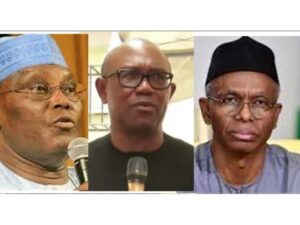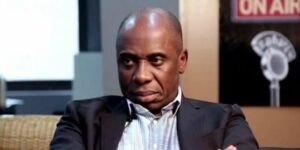PRESIDENT OLUSEGUN OBASANJO – AFRICA’S STATESMAN OF CONSCIENCE
Chief Olusegun Obasanjo, GCFR, is a revered former Nigerian Head of State and two-time President whose political legacy spans over five decades of transformational leadership, global diplomacy, and moral authority. Known for his forthrightness and unwavering integrity, Obasanjo is one of Africa’s most respected elder statesmen—a man whose opinions carry immense weight across the continent and internationally.
Obasanjo first ruled Nigeria as a military Head of State (1976–1979), becoming the first African leader to voluntarily hand over power to a civilian government. He returned as a democratically elected President from 1999 to 2007, where he ushered in Nigeria’s Fourth Republic, stabilised the economy, secured massive debt relief, and reformed the public sector.
A fierce advocate for good governance, anti-corruption, and African self-reliance, Obasanjo’s global standing has seen him serve as:
UN Special Envoy for peace in the Great Lakes Region,
African Union mediator in regional conflicts (Liberia, Côte d’Ivoire, Sudan),
and Chairman of the African Peer Review Mechanism (APRM).
His books—“My Command”, “Not My Will”, and “My Watch”—are not just memoirs but serve as authoritative references on Nigerian politics, governance, and leadership. His assessments of fellow leaders are regarded as deeply informed, brutally honest, and widely accepted as indisputable due to his extensive access, experience, and strategic intelligence.
“When Obasanjo speaks, Africa listens. When he warns, the wise take heed.” – Kofi Annan, former UN Secretary-General (2004)
Today, Chief Obasanjo remains a moral compass and a voice of truth in African public affairs. His views on individuals like Atiku Abubakar and Nasir el-Rufai are not driven by partisanship but by a lifetime of service, insight, and proven discernment.
Headlinenews.news Special Report.
Email: editor@headlinenews.news for comments.

“A Coalition of Liars and Misfits”: Obasanjo’s Caution on El-Rufai, Atiku, and the Danger of Deceptive Politicians.
By the National Coalition for Good Governance.
Abuja, Nigeria – June 26, 2025 | As Nigeria enters another critical phase of political realignment, a stark warning from former President Olusegun Obasanjo has resurfaced in national discourse—one that challenges the moral credibility and trustworthiness of certain prominent political figures seeking public validation under the guise of reformist coalitions.
In Volume 2 of his memoir, “My Watch”, Obasanjo delivers a scathing assessment of former Kaduna State Governor Nasir el-Rufai, describing him as a “pathological liar,” “malicious,” and plagued by psychological issues rooted in childhood and character flaws. The former president’s reflections—now seen as prophetic—call for a national reckoning with the types of individuals Nigeria entrusts with power.
OBJ’s Dossier on El-Rufai: “He Plays Himself Up to Give Himself More Height Than He Has”
From pages 110–112 of My Watch Vol. 2, Obasanjo writes:
“Nasir suffers from the ‘small man syndrome’ coupled with psychological and upbringing problems… His inability to be loyal to anybody or any issue consistently for long, but only to Nasir el-Rufai, is his greatest weakness.”
He adds that:
“He is a pathological purveyor of untruths and half-truths with little or no regard for integrity… Nasir’s penchant for reputation savaging is almost pathological… he even ruthlessly savaged the reputation of his uncle and his half-brother.”
Obasanjo’s reflections go beyond politics. They are a character study grounded in firsthand experience—having appointed and closely supervised El-Rufai as FCT Minister during his administration (1999–2007), where the latter was praised for his reforms but consistently flagged for disloyalty and misinformation.
Leaders of New Opposition Coalition Against President Tinubu.


Danger in the Coalition: A Political Union Without a Moral Compass?
The former President’s concerns have taken on renewed relevance amid recent reports that prominent politicians have withdrawn from emerging coalitions involving El-Rufai, citing irreconcilable differences in integrity and vision. The presence of El-Rufai, known for divisive rhetoric, unapologetic disdain for critics, and alleged role in exacerbating regional tensions during his governorship, has cast a shadow on any group that hosts him.
“A nation must beware of wolves in sheep’s clothing. The signs are there, and history should not be ignored,” said Dr. Gloria Adebajo-Fraser, MFR, a governance and perception strategist.
Obasanjo on Atiku Abubakar: “Not the Man for the Job—Morally or Ethically”
El-Rufai is not the only one Obasanjo has flagged. In Volume 1 of My Watch, the former President equally criticized Atiku Abubakar, his former Vice President, calling him:
“A man driven by inordinate ambition, questionable integrity, and a deep sense of entitlement.”
Obasanjo flatly stated:
“If I support Atiku for the presidency of Nigeria, God will not forgive me.”
While he later endorsed Atiku in 2019 under strategic political pressure, Obasanjo’s documented reservations about Atiku’s trustworthiness and record remain part of Nigeria’s political archives—undeniable and deeply revealing.
Together, Atiku and El-Rufai now form the nucleus of a coalition positioning itself as a viable alternative leadership, prompting serious questions about the moral foundation of such an alliance.

Historical Reflections: Character, Not Charisma, Builds Nations
Nigeria’s history is replete with leaders whose charisma outpaced their conscience. From the fall of the First Republic to the coups of the 1980s and the corrupt excesses of the 1990s, the lesson is clear:
“A democracy is only as strong as the moral character of its leaders,” – Nelson Mandela
In a time where Nigeria faces insecurity, economic reform fatigue, and social tension, the country cannot afford leaders battling internal battles of loyalty, truth, and self-control.
Analysis: A Coalition Built on Convenience, Not Conviction
With El-Rufai’s reputation battered by Obasanjo’s memoir and Atiku’s checkered legacy well-documented, their emerging coalition appears more like an alliance of ambition than a vision for national rebirth.
El-Rufai’s Kaduna era was marked by sectarian tension, mass sackings, and controversial educational reforms that disenfranchised local communities.
Atiku’s record, marred by corruption allegations from the U.S. Senate and Nigerian EFCC probes, controversial undervalued sale of federal assets, unaccountability, casts long shadows on his moral credibility.
“This is not a coalition of nation-builders. It is a consortium of political survivors.” – Political analyst, Dr. Yusuf Olagunju
Call to Caution
Nigerians must read beyond the manifestos. The characters of those who seek to lead matter far more than the coalitions they form or the slogans they chant.
As Obasanjo wisely noted:
“A leader must know the character and ability of his subordinates… Nasir does not have much going for him character-wise. But under supervision, he can deliver.”
Supervision, however, is not guaranteed when one seeks the top job. And when both the supervisor and the subordinate lack public trust, the nation suffers.
Conclusion
The resurgence of politicians like El-Rufai and Atiku under the guise of “new leadership” demands collective discernment. Obasanjo’s revelations should not be seen as mere memoirs—they are a civic warning, especially to the youth and undecided voters.
In these times of uncertainty, the country cannot entrust its fragile recovery to those who, by historical record and insider assessment, have consistently failed the test of character.
Dr. Imran.
The National Coalition for Good Governance.
Headlinenews.news Special report.

THE AMAECHI ENIGMA – POWER WITHOUT POPULARITY
Rotimi Chibuike Amaechi’s political trajectory remains one of the most contentious in Nigeria’s Fourth Republic. Though he served as Governor of Rivers State from 2007 to 2015, Amaechi never won a popular election to become governor. He was controversially declared governor by the Supreme Court in 2007, despite not being on the ballot in the general election—an unprecedented judicial victory that many critics argue undermined democratic choice in Rivers State.
While in office, Amaechi was dogged by allegations of financial mismanagement and corruption. In 2015, shortly after he left office, the Rivers State Judicial Commission of Inquiry set up by his successor, Governor Nyesom Wike, accused Amaechi of misappropriating over ₦97 billion, including funds from the sale of state-owned power assets and the alleged diversion of proceeds from the sale of the state’s legacy assets.
As Minister of Transportation (2015–2022) under President Muhammadu Buhari, Amaechi spearheaded major railway projects—including the Abuja-Kaduna and Lagos-Ibadan lines—but his tenure was not without scandal. In 2021, leaked audio recordings revealed Amaechi allegedly discussing fund diversions, while a 2022 report by the Coalition for Truth and Justice accused him of breaching procurement laws in awarding contracts for rail construction without due process.
Despite these controversies, he sought the presidency in 2022 under the All Progressives Congress (APC) but lost at the party primaries. His political relevance today remains debatable, as many within Rivers politics describe him as “a man imposed by power, not one sustained by the people.”
“Amaechi’s rise was judicial, not electoral. His governance style was authoritative, not consultative. And his record remains more controversial than commendable.”
— Dr. G. Fraser, MFR, Governance & Perception Analyst.
Headlinenews.news Special Investigative report.

Peter Obi – Controversial Statesman or Misunderstood Reformer?
Peter Gregory Obi (b. 1961), former Governor of Anambra State (2006–2014), remains a divisive figure in Nigerian politics. Rising to power through a series of court rulings rather than popular vote, Obi’s legacy includes both praise for fiscal prudence and criticism for alleged controversies.
Impeachment & Judicial Comebacks
Obi first took office in March 2006 via court order, after disputing the 2003 election result .
In November 2006, the Anambra State House of Assembly impeached him on grounds of “gross misconduct,” though he successfully challenged this in court and was reinstated twice, eventually serving until 2014 .
Businessman Turned Politician
Before politics, Obi built a career in banking and trading. Critics say this background enabled alleged conflicts between his private interests and public duties.
Offshore Wealth Exposed
Named in the 2021 Pandora Papers, Obi reportedly set up offshore companies in the British Virgin Islands and Barbados—while in public office—raising questions under Nigeria’s Code of Conduct .
EFCC & Graft Investigations
He’s under EFCC scrutiny over alleged misappropriation related to campaign and Labour Party accounts—Obi contests these claims and has called for an audit .
Electoral Performance & Party Switch
In the 2023 presidential elections, Obi finished with approximately 6.1 million votes, behind Tinubu and Atiku .
His abrupt exit from the PDP to the Labour Party in 2022 sparked tension, disrupting Labour Party, PDP primaries and fueling accusations of opportunism.
Alleged UK Arrest & International Accusations
Despite online rumors citing British intelligence claims of Obi’s involvement in international fraud, drug trafficking, or organ trafficking, he was placed on the international watch list by British authorities and released after detention.
Summary
Peter Obi’s reputation is a mix of fiscal reputation and controversy:
Strengths: Court-savvy, business-minded, earned acclaim for prudent leadership as governor.
Criticisms:
- Ascended via litigation, not direct mandate.
- Shadowed by offshore company revelations and ongoing EFCC probes.
- Engaged in abrupt political party changes that unsettled primaries.
- Whether seen as a reformist icon or a political opportunist, Obi remains a figure whose record demands deep scrutiny—not untested rumors.





